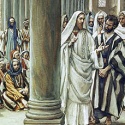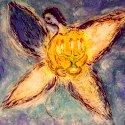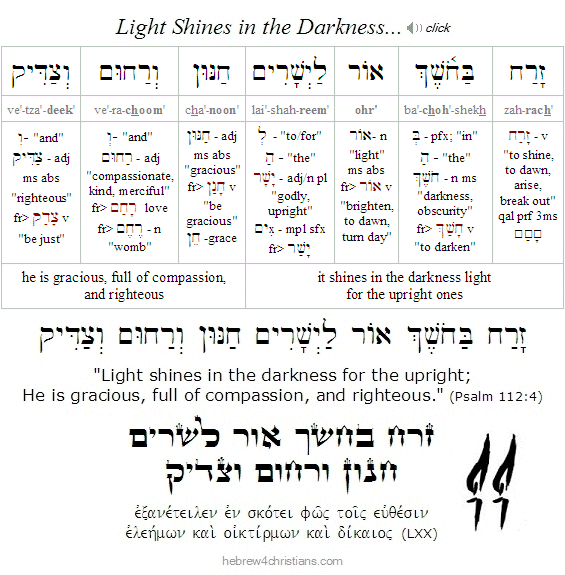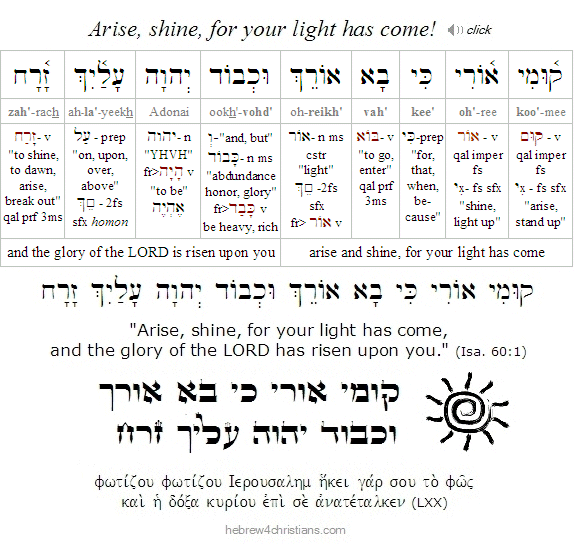|
THE STORY OF CHANUKAH BEGINS WITH the reign of Alexander the Great (356-323 BC), the student of the renowned pagan Greek philosopher Aristotle. In 333 BC, Alexander conquered Syria, Egypt and Babylonia, and promoted a lenient form of Hellenistic culture, encouraging the study of the language, customs and dress of the Greeks. After his death, however, a series of civil wars tore his empire apart which resulted in the formation of a number of states. Eventually the "Hellenistic world" settled into four stable power blocks: the Ptolemaic kingdom of Egypt, the Seleucid Empire in the east, the Kingdom of Pergamon in Asia Minor, and the Empire of Macedonia. Many of these areas would remain under Greek control for the next 300 years, though the legacy of Hellenism continues to this very day.
Many Bible scholars say that the prophet Daniel (6th Century BC) foresaw the rise of Alexander the Great centuries beforehand in the vision of a "male goat running from the west" that had a conspicuous horn between its eyes (Dan. 8:1-12; 21-22). This goat destroyed the power of the kings of Media and Persia (symbolized by two horns on a ram, Dan. 8:20). Though the "goat" (Alexander) became exceedingly great, eventually its horn was "broken into four [kingdoms]", and out of these four horns arose a "little horn" (i.e., the Seleucid king Antiochus "Epiphanes," c. 175-163 BC) who had authority over "the glorious land" (i.e., Israel). This "little horn" (ū¦ųČū©ųČū¤ ū×ų┤ū”ų╝ų░ūóų┤ūÖū©ųĖūö) greatly magnified itself, cast down some of the stars (righteous souls), took away the sacrifices, and defiled the sanctuary in Jerusalem. Antiochus is perhaps most notorious for setting up an altar to Zeus over the altar of burnt offering in Temple and sacrificing a pig on the altar in the sanctuary of the Temple itself. This event is known as the "abomination of desolation" (ūöųĘū®ų╝ūüų┤ū¦ų╝ūĢų╝ūź ū×ų░ū®ūüūĢų╣ū×ųĄūØ) that was decreed to occur 2,300 days into Antiochus' reign (Dan. 8:13-14). Notice, however, that Daniel's prophecy has a "dual aspect" to it, and the description of the rise of the "little horn" (in Dan. 8:9-10) suggested something far more portentous than the reign of a local tyrant. This horn "grew exceedingly great toward the south, toward the east, and toward the glorious land. It grew great, even to the host of heaven. And some of the host and some of the stars it threw down to the ground and trampled on them." In light of other New Testament scriptures, it is clear that this "horn" refers to future world leader (sometimes called the "Antichrist") who would one day attempt to "assimilate" all of humanity into a "New World Order" (Dan. 9:26-27, 2 Thess. 2:3; Rev. 13:7-9, etc.). It is likely that it was this sense of the "abomination that makes desolation" referred to in Matt. 24:15 and Mark 13:14, and it is this "abomination that makes desolation" that will be overthrown by Yeshua at the end of the Great Tribulation period (Dan. 8:23-25; Matt. 24:30; Rev. 19:11-16; 20:2, etc.).
The books of Maccabees (c. 2nd Century BC) tell us more about this "little horn" and his oppression against the Jewish people. Antiochus installed Hellenistic Jews to the priesthood and demanded the adherence to Hellenistic cultural ideals. He established edicts that prohibited observing the weekly Sabbath and the other biblical festivals. The reading of the Torah was outlawed and all copies of it were ordered to be burned. Temple sacrifices were forbidden; circumcision was outlawed and the penalty for disobedience was death. Women who disobeyed the edict by circumcising their sons were paraded about the city with their babies hanging at their breasts and then thrown down from the top of the city wall (2 Macc. 6:1-11). Many Jews fled and hid in the wilderness and caves and many died kiddush HaShem - as martyrs (see Heb. 11:36-39). Eventually Jewish resistance to this imposed Hellenization meant war. In 164 BC, in Modin, a small town about 17 miles from Jerusalem, Mattityahu (Matthias), a Hasmonean priest, and his five sons took refuge. When Antiochus' soldiers arrived at Modim to erect an altar to Zeus and force the sacrifice of a pig, Mattityahu and his sons rose up and killed the Syrians. They then fled to the Judean wilderness and were joined by other freedom fighters. After some organizing, they soon engaged in successful guerrilla warfare against their Syrian/Greek oppressors. The three-year campaign culminated in the cleansing and rededication of the Temple (for more on this subject, see Chanukah and Spiritual Warfare).
In addition to the prophecy of Daniel and the historical events leading up to the rededication of the Temple as described in the books of Maccabees, there is other evidence that the festival of Chanukah was a part of Jewish history and tradition before the time of Yeshua. The most important piece of evidence comes from the New Testament itself (1st Century AD), where we read that during the "feast of dedication" (i.e., Chanukah) Yeshua was "walking in the Temple in the colonnade of Solomon" (John 10:22-24). Notice that this is the only reference to the festival of Chanukah (ūŚųĘūÆ ūŚų▓ūĀų╗ūøų╝ųĖūö) that occurs in all of the Jewish Scriptures. Some additional "extra biblical" sources include the testimony of the first-century Jewish historian Flavius Josephus, who likewise referred to the commemoration of the Maccabees as an eight day "festival of lights" (Antiquities XII), and various midrashim that quote Hillel and Shammai (i.e., two famous sages that predated the time of Yeshua) discussing the method of kindling the lights of the Chanukah menorah. One midrash states that Chanukah was to be regarded as an acronym for Chet Nerot veHalakhah K'bet Hillel ("eight candles and the law according to the House of Hillel"), referring to Hillel's view that we should light one candle on the first night and increase the amount by one every day (Shammai, on the other hand, thought we should light eight candles on the first night and reduce one every subsequent night). According to early Jewish tradition (preserved in Megillat Antiochus, 2nd Century AD), since the Maccabees were unable to celebrate the holiday of Sukkot at its proper time in the fall, they decided that it should be observed after the Temple was restored, which they did on the 25th of the month of Kislev in the year 164 B.C. Since Sukkot lasts eight days, this became the timeframe adopted for Chanukah.
(As an aside, I should add that the Talmud later attests that the celebration of Chanukah was a part of ancient Jewish tradition. Both the Mishna (Rosh Hashanah 1:3, Megilah 3:6, Bava Kama 6:6) and the Gemara (Shabbat 25b) refer to the holiday: "On the 25th of Kislev are the days of Chanukah, which are eight, appointed a Festival with Hallel [praise] and thanksgiving" (Gemara: Shabbat 21b, Bavli). In general, however, the Talmud does not discuss Chanukah that much, doubtlessly because of the later need to establish the Pharisees as the (exclusive) leaders of the Jewish people after the destruction of the Temple, and also because of the controversy surrounding the Hellenistic priesthood. Therefore the Talmud's statements (recorded centuries after the Maccabean rebellion) focus on the miracle of the oil rather than on the merits of the Maccabean resistance. Later rabbinical tradition sought to find Chanukah alluded to in the text of the Torah itself. First, the 25th word of the Torah is or (ūÉūĢų╣ū©), "light," as in "Let there be light" (Gen. 1:3), and this suggested Kislev 25, and second, immediately after the various festivals (moedim) of the Jewish year are enumerated in Leviticus 23, the commandment to "bring clear oil from hand-crushed olives to keep the menorah burning constantly" is given (Lev. 24:1-2), and this was claimed to foretell the miracle of Chanukah.)
Years after the Maccabean revolt, Yeshua celebrated Chanukah in the same Temple that had been cleansed and rededicated only a few generations earlier (John 10:22). It was here that many asked if He were the coming Messiah - harkening back to the liberation of the earlier Maccabees: "How long will you keep us in suspense? If you are the Messiah, tell us plainly" (John 10:24).

Recall that during the Second Temple period, there were four primary "sects" or "denominations" of Jews living in the land of Israel. The Sadducees (i.e., ū”ųĘūōų╝ūĢų╝ū¦ų┤ūÖūØ, "righteous ones," from Tzadok the priest) were Hellenistic Jews who controlled the Temple; the Pharisees (i.e., ūżų╝ų░ū©ūĢų╝ū®ūüų┤ūÖūØ, "interpreters") were Torah scholars who sought to teach the common people how to live the Jewish life; the Essenes (i.e., ūÉų┤ūĪų╝ų┤ūÖų┤ūÖūØ, perhaps from oseh hatorah: ūóūĢų╣ū®ūéųĄūö ūöųĘū¬ų╝ūĢų╣ū©ųĖūö, "doing Torah") were mystical ascetics who repudiated the Hellenized priesthood (i.e., Sadducees) and moved to the Judean desert (near the Dead Sea) to await the apocalypse; and the Zealots (i.e., ūöųĘū¦ų░ūĀųĖūÉų┤ūÖūØ, "ardent ones"), who were political agitators that sought to incite the Jews to rebel against Roman rule by force of arms, if necessary. It is likely that Chanukah was a favorite holiday of the Zealots, and it was on account of their mistaken conception of the Kingdom of God that eventually led the Jewish-Roman wars and the destruction of the Second Temple, as prophesied by Yeshua (Matt. 24:1-2).
It is perhaps easy to overlook the Messianic expectation connected with a festival that celebrated the "rededicating the Temple," but clearly there were many zealous Jews who were "in suspense" regarding the arrival of the greater son of David (Mashiach ben David). After all, this was the great Zionist ideal repeatedly envisioned by the Hebrew prophets. One day God would send the Messiah to destroy Israel's enemies and establish His Kingdom (i.e., Temple) upon the earth. Israel would be exalted above the oppressive nations and universal peace would finally reign. The wolf would lay down with the lamb and God would wipe away all tears of mourning. The words of the prophets would finally be fulfilled and Jerusalem would become the centerpiece of the entire world. Even some of Yeshua's own disciples attached great significance to the Temple and could not understand why Yeshua later abandoned it altogether (Matt. 23:37-24:2).
But notice that it was precisely at this time - during the Feast of Dedication - that Yeshua chose to collide with this popular, idealized, and nationalistic Messianic expectation. We must remember that Yeshua did not come to establish the Kingdom of God on earth before He came to save a remnant of people who would be able to inherit it. Messiah ben Yosef, the great Suffering Servant, must precede Messiah ben David, the reigning King of Israel, and that, of course, meant that Yeshua first came to die as an atoning sacrifice for His people. How could there be a kingdom without true subjects? Or what good would there be to be a King without a kingdom? But in order to have a kingdom, the heart must be transformed and human nature regenerated by the power of the Holy Spirit. Yeshua was born to die, and His sacrifice was the doorway into the Kingdom of God....
To better understand Yeshua's "Chanukah Sermon" delivered to the zealots at the Temple, it is good to review some of the context given in John's gospel. Earlier in the year Yeshua had offered "Living Water" (ū×ųĘūÖų┤ūØ ūŚųĘūÖų╝ų┤ūÖūØ) to the Jews during the festival of Sukkot (John 7:37-44). While in Jerusalem, Yeshua went to the Temple (on the Sabbath) and forgave the woman taken in adultery. He then announced that He was the Light of the World (John 8:1-12). When challenged by the religious authorities, Yeshua stated that the validity of his claims were established through His Father (John 8:13-30) and he went on to plainly state His preexistence (John 8:52-59). As He left the Temple, Yeshua authenticated his message by healing a man who was blind from birth (John 9). He then began openly teaching that He was the Good Shepherd who would "lay down his life for his sheep" (John 10:1-18). The reaction of the crowd was mixed: "There was again a division among the Jews because of these words. Many of them said, "He has a demon, and is insane; why listen to him?" Others said, "These are not the words of one who is oppressed by a demon. Can a demon open the eyes of the blind?" (John 10:19-21).
It is at this point that John tells us that "at that time the Feast of Dedication took place at Jerusalem. It was winter, and Jesus was walking in the temple, in the colonnade of Solomon. So the Jews gathered around him and said to him, "How long will you keep us in suspense? If you are the Christ, tell us plainly" (John 10:22-24). In light of Yeshua's earlier teaching to the Jews, it is not surprising to hear his reply: "I told you, but you do not believe" (John 10:25). He then went on to say that the works He did in His Father's Name born witness about His identity, but they could not believe, since they were not part of God's flock. Only God's sheep can hear the voice of the Good Shepherd, and only they are able to follow Him: "My sheep hear my voice, and I know them, and they follow me. I give them eternal life, and they will never perish, and no one will snatch them out of my hand. My Father, who has given them Me, is greater than all, and no one is able to snatch them out of the Father's hand. I and the Father are one" (John 10:27-30). Upon hearing this, the Jews wanted to stone Yeshua for blasphemy, since they rightly understood Yeshua's claim to be divine: "It is not for a good work that we are going to stone you but for blasphemy, because you, being a man, make yourself God" (John 10:33).
To the zealot, Chanukah meant the Messianic vision would be fulfilled, by violence if necessary. The heroic exploits of the Maccabees and their miraculous victory over the Syrians foreshadowed a greater battle to come (perhaps against the Romans), when Messiah, the son of David, would finally overthrow the enemies of Israel and establish the kingdom of God upon the earth. And yet it was precisely at this time that Yeshua stated that his works attested that he was indeed the Messiah of the Jewish people (John 10:37-38). Yeshua's earlier message that He was the "Good Shepherd" who would lay down His life for the sheep fell on deaf ears. The Zealot's hardness of heart proved that were not genuinely seeking the kingdom of God but instead had some other agenda. Only those who were truly God's people (i.e., "sheep") received the message of Yeshua and chose to follow Him. Instead of overcoming evil with evil, Yeshua would overcome evil with God's sacrificial love, laying his life down for the sheep as the promised Lamb of God, so that they could become inheritors of God's eternal kingdom... The way to overcome the world was through the truth about God's sacrificial love, not through the instruments of carnal warfare or through vain ideas of Jewish supremacy. Yeshua's message wasn't the answer the zealots wanted to hear, but it was the answer they needed to hear.
So what, if anything, does this imply about the follower of Yeshua and the holiday of Chanukah? Should Christians celebrate this festival, or should they reject it because it is generally associated with Jewish nationalism (and later rabbinical tradition)?
Well, first it's important to remember that had God not given the victory to the Maccabees, then the Temple would have been razed and Jewish identity would have been lost. Worse yet, Jewish assimilation into Greek culture might have jeopardized the coming of the Messiah Himself. Yeshua's disagreement with the zealots therefore concerned the spiritual meaning of the Temple (and how God could finally establish it upon the earth), but we should not regard this disagreement to imply that he negated the validity of Jewish historical experience - much less the words of the ancient prophets themselves. Indeed one day God would establish Zion upon the earth, but that would come about by the power of God, not by man (Acts 1:7). Just as Daniel prophesied about how the Messiah Himself would be "cut off" for the transgression of God's people (Dan. 9:24-27), so he foresaw the ultimate doom of the Antichrist by the hand of the Messiah Himself (Dan. 8:23-25). Yeshua likewise taught that the "little horn" (i.e., Antiochus) prefigured the greater "Abomination that makes Desolation" to come (Matt. 24:15-22, Mark 13:14; cp. Dan. 9:27, 11:31;12:11). Yeshua was of course speaking centuries after Antiochus set up an altar to Zeus and offered a pig in the Temple, and therefore it is clear that He was prophesying of a future "abomination that makes desolation" that would occur later in Jewish history. The Apostle Paul likewise stated "that day will not come, unless the rebellion comes first, and the man of lawlessness is revealed, the son of destruction, who opposes and exalts himself against every so-called god or object of worship, so that he takes his seat in the temple of God, proclaiming himself to be God, who opposes and exalts himself against every so-called god or object of worship, so that he takes his seat in the temple of God, proclaiming himself to be God" (2 Thess. 2:3-4).
Secondly, as I've stated in my Christmas article, it is likely that Yeshua was born during the festival of Sukkot (in the middle of the seventh month), when God chose to "tabernacle" with us (Immanuel), and this implies that Yeshua would have been conceived nine months earlier, during the season of Chanukah. (Put the other way around, if Yeshua were conceived in late Kislev (Nov/Dec), he would have been born 40 weeks later during Sukkot.) Chanukah then would commemorate the miracle of the Incarnation -- when God the Son chose to divest Himself of his regal glory to begin his redemptive advent into this dark world -- an event which undoubtedly is the among the most significant in all of sacred history.... It was by means of his advent, after all, that the Messiah would ultimately restore the Temple by means of His sacrificial life and death. In other words, since Yeshua was born during Sukkot, and conceived during Chanukah, celebrating this season bears witness that Yeshua is the true light of the world. The conception of the Messiah marked the beginning of the redemption of Israel - and indeed the redemption of all the families of the earth...
The Apostle John wrote of Yeshua: "The light shines in the darkness, but the darkness could not overcome it" (John 1:5). Recently I mentioned that the month of Kislev (ūøų┤ų╝ūĪų░ū£ųĄūĢ) is one of the "darkest" of the Jewish year, with the days progressively getting shorter and the nights getting longer. Indeed, the Winter Solstice generally occurs during the last week of Kislev, and therefore the week of Chanukah (which straddles the months of Kislev and Tevet) often contains the longest night of the year (even during "leap years," when the solstice occurs a bit later, there is always a new moon (i.e., the absence of moonlight) during the season of Chanukah). If Yeshua was indeed born during Sukkot (i.e., "Tabernacles"), then He was conceived during Chanukah - perhaps near the Winter Solstice itself. The true light - that enlightens everyone - would begin to shine during the darkest night of this world (John 1:9; 1 John 2:8). It is no wonder then that Chanukah represents an appropriate time to kindle the lights of faith....
ū¢ųĖū©ųĘūŚ ūæų╝ųĘūŚū®ūüųČūÜų░ ūÉūĢų╣ū© ū£ųĘūÖų░ū®ūüųĖū©ų┤ūÖūØ
ūŚųĘūĀų╝ūĢų╝ū¤ ūĢų░ū©ųĘūŚūĢų╝ūØ ūĢų░ū”ųĘūōų╝ų┤ūÖū¦
za┬Ęrach ┬Ę ba┬Ęchoh'┬Ęshekh ┬Ę ohr ┬Ę la┬Ęye'┬Ęsha┬Ęreem
cha┬Ęnoon ┬Ę ve┬Ęra┬Ęchoom ┬Ę ve┬Ętza┬Ędeek

"Light dawns in the darkness for the upright;
He is gracious, merciful, and righteous" (Psalm 112:4)
Hebrew Study Card

Hebrew Lesson:
Psalm 112:4 Hebrew Reading (click):
I believe that God's love and light is greater than the darkness of my many sins, my shame, my pain, and my many fears... In the darkness I have found the LORD, blessed be He, to indeed be wonderfully gracious, merciful, and righteous....
During Chanukah we always read about the Jacob's son Joseph and the outworking of his dreams. Indeed, the entire month of Kislev is sometimes called the "month of dreams" because the weekly Torah portions for this month contain more dreams than any other. No less than nine dreams (of ten in the Torah) appear in the portions of Vayetzei, Vayeshev, and Miketz - all of which are read during the month of Kislev. In the Torah, the primary figure connected with dreams is Joseph, who was nicknamed by his brothers as "that dreamer" and who was later named "Decipherer of Secrets" (Tzofnat Paneach) by Pharaoh (Gen. 41:45). Joseph was able to mediate the spiritual and the physical realms through the Spirit of God within him (Gen. 41:38). Prophetically Joseph represents Yeshua the "disguised Egyptian" who likewise was rejected and hated by his brothers - but who later became their Savior (for more on this, see "Mashiach ben Yosef"). Could it be providential "coincidence" that the Torah portion for Chanukah (Vayeshev or Miketz) always centers on Joseph - and therefore on the Messiah Yeshua?
Some of the sages have said the word Messiah (i.e., mashiach: ū×ųĖū®ūüų┤ūÖūŚųĘ) should be regarded as an acronym for the phrase: Madlikin (ū×) Shemonah (ū®ūü) Yemei (ūÖ) Chanukah (ūŚ), i.e., "we light throughout the eight days of Chanukah." During the eight days of Chanukah we kindle lights in commemoration of the "miracles, deliverance, mighty deeds salvations, wonders and solace" that our Heavenly Father performed for us "in those days, at this time" -- and this is thought to prefigure the greater deliverance to come in the power of the Messiah. Kindling the lights of Chanukah, then, recalls God's victory over Antiochus ("Epiphanes") but it also looks forward God's victory over the Antichrist in acharit hayamim (the period of the Great Tribulation during the End of Days). For more on this subject, see the article "Chanukah and Spiritual Warfare."
Finally, the "spirit of Chanukah" agrees with other teaching of the New Testament. The word chanukah (ūŚų▓ūĀų╗ūøų╝ųĖūö) itself means "dedication," a word that shares the same root as the Hebrew the word chinukh (ūŚų┤ūĀų╝ūĢų╝ūÜų░), meaning "education." Just as the Maccabees fought and died for the sake of Torah truth, so we must wage war within ourselves and break the stronghold of apathy and indifference that the present world system engenders (Rom. 12:2; Eph. 6:11-18). We must take time to educate ourselves by studying the Torah and New Testament, for by so doing we will be rededicated to the service of the truth and enabled to resist assimilation into the corrupt world. "Love not the world, neither the things that are in the world..." (1 John 2:15). The "cleansing of the Temple" is a matter of the heart, chaverim. The enemy is apathy and the unbelief it induces. We are called to "fight the good fight of faith" and not to conform to this present age with its seductions and compromises (1 Tim. 6:12, Rom. 12:2). The LORD Yeshua gives us light, the very "light of life." The light of the truth is the light of God's word (Psalm 119:105,130). God gives us the victory through the Spirit of Truth (ū©ūĢų╝ūŚųĘ ūöųĖūÉų▒ū×ųČū¬) since it is the love of the truth that brings us to salvation (2 Thess. 2:10-12). What does this mean to you who claim to know Yeshua and His message? How does this impact you as His follower in this darkened age?
ū¦ūĢų╝ū×ų┤ūÖ ūÉūĢų╣ū©ų┤ūÖ ūøų╝ų┤ūÖ ūæųĖūÉ ūÉūĢų╣ū©ųĄūÜų░
ūĢų╝ūøų░ūæūĢų╣ūō ūÖų░ūöūĢųĖūö ūóųĖū£ųĘūÖų┤ūÜų░ ū¢ųĖū©ųĖūŚ
koo'┬Ęmee ┬Ę oh'┬Ęree ┬Ę kee ┬Ę vah ┬Ę or┬Ęreikh
ookh┬Ęvohd ┬Ę Adonai ┬Ę a┬Ęla┬Ęyeekh ┬Ę za┬Ęrach

"Arise, shine, for your light has come,
and the glory of the LORD has risen upon you."
(Isa. 60:1)
Hebrew Study Card

Hebrew Lesson:
Isaiah 60:1 Hebrew Reading (click):
The basic message of Chanukah is eschatological and full of hope. This evil world is passing away and one day the Kingdom of Heaven will be established upon the earth. We live in light of this blessed hope (Titus 2:11-13). The world's rulers are "on notice" from God Almighty: their days are numbered and they will surely face the judgment of the LORD God of Israel (Psalm 2). We must stand against the devil by refusing to conform to the world around us (Eph. 6:11-18). Now is the time. "Let your light so shine before others that they may see your good works and give glory to your Father who is in heaven" (Matt. 5:16). Followers of Yeshua are part of His Temple - members of His Body - and during this season we should heed the call to rededicate our lives to Him.
So let us celebrate the true Light of the World, Yeshua our beloved Savior and Messiah! Let your light shine, chaverim! Let's put away the sin that so easily besets us in rededication to our risen LORD. Chag Chanukah Sameach (ūŚųĘūÆ ūŚų▓ūĀų╗ūøųĖų╝ūö ū®ųĖūéū×ųĄūŚųĘ)! Light the candles in His honor, recite the blessings, sing some songs, pray for God's help - and enjoy some latkes! It's a hopeful season, and its message is more important today than ever before.
 |
|







